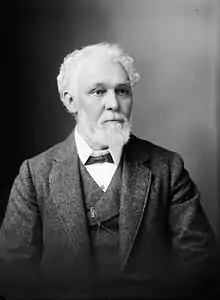John Graham (New Zealand politician)
John Graham (12 January 1843 – 8 February 1926) was a New Zealand Member of Parliament for Nelson in the South Island.
John Graham | |
|---|---|
 | |
| Member of the New Zealand Parliament for Nelson | |
| In office 1893–1911 | |
| Preceded by | Joseph Harkness |
| Succeeded by | Harry Atmore |
| Personal details | |
| Born | 12 January 1843 Nelson, New Zealand |
| Died | 8 February 1926 Feilding, New Zealand |
| Political party | Liberal |
Early life
Graham was born in Nelson in 1843, the eldest son of one of the earliest European settlers of the region.[1]
Member of Parliament
| Years | Term | Electorate | Party | ||
|---|---|---|---|---|---|
| 1893–1896 | 12th | Nelson | Liberal | ||
| 1896–1899 | 13th | Nelson | Liberal | ||
| 1899–1902 | 14th | Nelson | Liberal | ||
| 1902–1905 | 15th | Nelson | Liberal | ||
| 1905–1908 | 16th | Nelson | Liberal | ||
| 1908–1911 | 17th | Nelson | Liberal | ||
John Graham represented the Nelson electorate in the House of Representatives for 18 years from 1893 to 1911, when he retired.[1][2]
The 1893 general election was contested by four candidates in Nelson: Graham (1289 votes), Richmond Hursthouse (1011 votes), John Kerr (910 votes) and William Lock (74 votes).[3] The 1896 general election was contested by Graham and Jesse Piper, who received 2061 and 1718 votes, respectively. Graham was thus elected with a majority of 343 votes.[4]
Independent Liberal
In 1894, Graham successfully opposed the Midland Railway Bill insofar as it proposed to abandon the obligations of the company to provide a railway to Nelson.[5]
As Chairman of the Banking Enquiry Committee of 1896, John Graham frequently came into conflict with the Premier Richard Seddon, the Minister of Lands, John McKenzie, and George Hutchison[6]
Public offices
Graham was for some years chairman of the Town Schools' Committee.[1] He was the first chairman of the Nelson Harbour Board and held that position for twelve years.[7] He served on the Nelson Education Board, the Board of Governors of Nelson College (1894) and Council of Victoria College in Wellington (1899–1912). He was also a member of the Nelson City Council.[8]
Death
Graham died in Feilding on 8 February 1926, after having lived in Nelson for practically all of his life.[1]
See also
References
- "Obituary". The Evening Post. Vol. CXI, no. 34. 9 February 1926. p. 9. Retrieved 22 July 2011.
- Wood, G. Antony (ed.) (1996), Ministers and Members in the New Zealand Parliament, Dunedin, [N.Z.]: University of Otago Press, p. 200
{{citation}}:|first=has generic name (help) - "Nelson City". Nelson Evening Mail. Vol. XXVII, no. 281. 29 November 1893. p. 2. Retrieved 21 July 2011.
- "The Nelson Election". Nelson Evening Mail. Vol. XXX, no. 292. 10 December 1896. p. 2. Retrieved 21 July 2011.
- Scholefield, Guy H. (ed.) (1940), A dictionary of New Zealand biography (2 vol.), Wellington, [N.Z.]: Dept. of Internal Affairs
{{citation}}:|first=has generic name (help) I:316. - The Cyclopedia of New Zealand: industrial, descriptive, historical, biographical facts, figures, illustrations (6 vol.), Wellington, [N.Z.]: Cyclopedia Co., 1897–1908 Vol. 5 (1906) p. 31.
- "Harbour Board Meeting". The Evening Post. Vol. CXI, no. 37. 12 February 1926. p. 11. Retrieved 22 July 2011.
- The Cyclopedia of New Zealand: industrial, descriptive, historical, biographical facts, figures, illustrations (6 vol.), Wellington, [N.Z.]: Cyclopedia Co., 1897–1908 Vol. 5 (1906) p. 30.